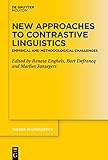New Approaches to Contrastive Linguistics : Empirical and Methodological Challenges / ed. by Renata Enghels, Marlies Jansegers, Bart Defrancq.
Material type: TextSeries: Trends in Linguistics. Studies and Monographs [TiLSM] ; 336Publisher: Berlin ; Boston : De Gruyter Mouton, [2020]Copyright date: ©2020Description: 1 online resource (V, 312 p.)Content type:
TextSeries: Trends in Linguistics. Studies and Monographs [TiLSM] ; 336Publisher: Berlin ; Boston : De Gruyter Mouton, [2020]Copyright date: ©2020Description: 1 online resource (V, 312 p.)Content type: - 9783110682397
- 9783110682670
- 9783110682588
- 410 23/eng/20230216
- online - DeGruyter
- Issued also in print.
| Item type | Current library | Call number | URL | Status | Notes | Barcode | |
|---|---|---|---|---|---|---|---|
 eBook
eBook
|
Biblioteca "Angelicum" Pont. Univ. S.Tommaso d'Aquino Nuvola online | online - DeGruyter (Browse shelf(Opens below)) | Online access | Not for loan (Accesso limitato) | Accesso per gli utenti autorizzati / Access for authorized users | (dgr)9783110682588 |
Frontmatter -- Contents -- Reflections on the use of data and methods in contrastive linguistics -- A roadmap towards determining the universal status of semantic frames -- Quantitative methods for corpus-based contrastive linguistics -- On the usefulness of comparable and parallel corpora for contrastive linguistics. Testing the semantic stability hypothesis -- Is German more nominal than English? Evidence from a translation corpus -- Using data from simultaneous interpreting in contrastive linguistics -- WH-ever in German, Dutch and English: a contrastive study showcasing the ConverGENTiecorpus -- Comparing corrective constructions: Contrastive negation in parallel and monolingual data -- Contrasting semantic fields across languages
restricted access online access with authorization star
http://purl.org/coar/access_right/c_16ec
The practice of comparing languages has a long tradition characterized by a cyclic pattern of interest. Its meeting with corpus linguistics in the 1990s has led to a new sub-discipline of corpus-based contrastive studies. The present volume tackles two main challenges that had not yet been fully addressed in the literature, namely an empirical assessment of the nature of the data commonly used in cross-linguistic studies (e.g. translation data versus comparable data), and the development of advanced methods and statistical techniques suitably adapted to contrastive research settings. The papers collected in this volume endeavour to find out what (new) types of data are most useful for what kind of contrastive questions, and which advanced statistical techniques are most suited to deal with the multidimensionality of contrastive research questions. Answers to these questions are provided through the contrastive analysis of various language pairs or groups, and a wide variety of phenomena situated at almost all linguistic levels. In sum, this book provides an update on new methodological and theoretical insights in empirical contrastive linguistics and will stimulate further research within this field.
Issued also in print.
Mode of access: Internet via World Wide Web.
In English.
Description based on online resource; title from PDF title page (publisher's Web site, viewed 25. Jun 2024)


